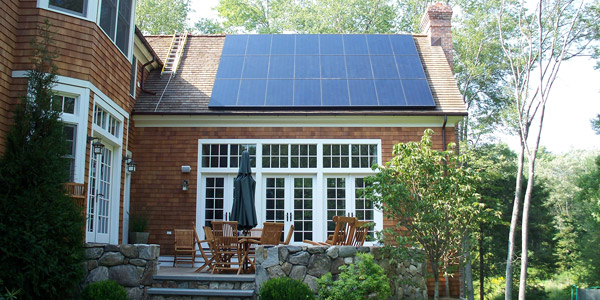By Michael Kuser
In a decision that could boost prospects for controversial state policies favoring select types of electricity generation, the Second Circuit Court of Appeals last week rejected a suit claiming that a Connecticut renewable energy procurement law intruded on FERC’s authority.

A wind turbine installation on I-95 in Fair Haven, CT.
The June 28 ruling affirmed a lower court decision in favor of a Connecticut law that requires the state to solicit proposals for renewable energy projects and utilities to enter into bilateral contracts with the winners. Renewable energy developer Allco Finance challenged the law’s implementation as discriminatory (16-2946, 16-2949).
The court also lifted an injunction it issued last November that blocked the awarding of clean energy contracts by Connecticut, Massachusetts and Rhode Island. (See Court Halts New England Clean Energy Contracts.)
The court’s opinion — which reviewed the Connecticut program based on the Supreme Court’s 2016 decision in Hughes vs. Talen — could influence district courts that are considering motions related to New York and Illinois policies providing zero-emission credits (ZECs) to nuclear plants. (See Federal Suit Challenges NY Nuclear Subsidies.)
FERC Authority
Hughes vs. Talen found that a Maryland plan to spur construction of new natural gas-fired generation encroached on FERC’s authority over wholesale prices under the Federal Power Act. But the Second Circuit ruling identified a key distinction between the Maryland and Connecticut programs.
“While Maryland sought essentially to override the terms set by the FERC-approved PJM auction, and required transfer of ownership through the FERC-approved auction, Connecticut’s program does not condition capacity transfers on any such auction,” the appeals court said. “Connecticut, instead, transfers ownership of electricity from one party to another by contract, independent of the auction.”
Furthermore, the contracts stemming from the requests for proposals are just the kind of bilateral agreements already subject to FERC oversight, the court said.
And while the appeals court affirmed that “states may not regulate interstate wholesale sales of electricity unless Congress creates an exception to the FPA,” it also determined that the Public Utility Regulatory Policies Act “contains such an exception, permitting states to foster electric generation by certain power production facilities … that have no more than 80 MW of capacity and use renewable generation technology.”
“The decision comes out on the right side legally, clearly on the better side for the states who want to set up programs to encourage renewable energy,” said Seth Jaffe of the law firm Foley Hoag, who wrote a blog post on the case. “The court properly noted that the state really wasn’t getting in the way of FERC setting wholesale prices.”
In a June 30 blog post, John Moore of the Natural Resources Defense Council wrote that “contrary to the claims of some generators who would like to see state energy laws invalidated per Hughes, the 2nd Circuit made clear that Hughes applies only to a narrow class of state schemes that, like Maryland’s, seek to ‘override’ the rate set by the FERC-approved auction and instead guarantee a generator a wholly different rate — not policies like the Connecticut clean energy programs.”
Dormant Commerce Clause Claims Rejected
The Second Circuit also rejected Allco’s claims that Connecticut violated the dormant Commerce Clause of the U.S. Constitution: the idea that states may not pass laws discriminating against interstate commerce to protect intrastate commerce. Allco argued Connecticut’s law violated the clause by making the state’s acceptance of renewable energy credits (RECs) contingent on the ability of a generator to deliver its electricity to the New England grid.

SunPower “Intelegant” award-winning installation in Westport, CT.
Allco claimed that Connecticut’s rules discriminated against the company’s solar facility in Georgia by not letting its RECs count toward Connecticut utilities’ renewable portfolio standard requirements. The company also argued that Connecticut discriminated against Allco’s New York facility in requiring producers of RECs in adjacent control areas to pay transmission fees in order to sell their credits to Connecticut utilities.
The Second Circuit first considered “whether the allegedly competing entities — Allco’s Georgia generator, on the one hand, and generators located in ISO-NE and adjacent control areas, on the other — provide different products, i.e., different RECs. We find that they do.” (See NYISO Sees Carbon Adder as Way to Link ZECs to Markets.)
The opinion gave “greater weight” to the market for RECs produced by generators able to connect to Connecticut’s grid and noted that “Connecticut’s RPS program makes geographic distinctions between RECs only insofar as it piggybacks on top of geographic lines drawn by ISO-NE and the [New England Power Pool], both of which are supervised by FERC — not the state of Connecticut.”
Regarding the court’s dormant Commerce Clause finding, Jaffe said, “I think they got it right; the reasoning is pretty sound, but I can certainly imagine people continuing to litigate this.”
The decision said it recognized “the importance of Connecticut’s interest in protecting the market for RECs produced within the ISO-NE or in adjacent areas. Connecticut’s RPS program serves its legitimate interest in promoting increased production of renewable power generation in the region.”
The court’s arguments in favor of the Connecticut program “are not that different from arguments that we’ve sometimes seen rejected by the courts, in saying, ‘Well, we understand the policy preference, but you’re not allowed to essentially discriminate,’” Jaffe said.
[Editor’s Note: An earlier version of this story said the ruling was by the D.C. Circuit Court of Appeals.]



